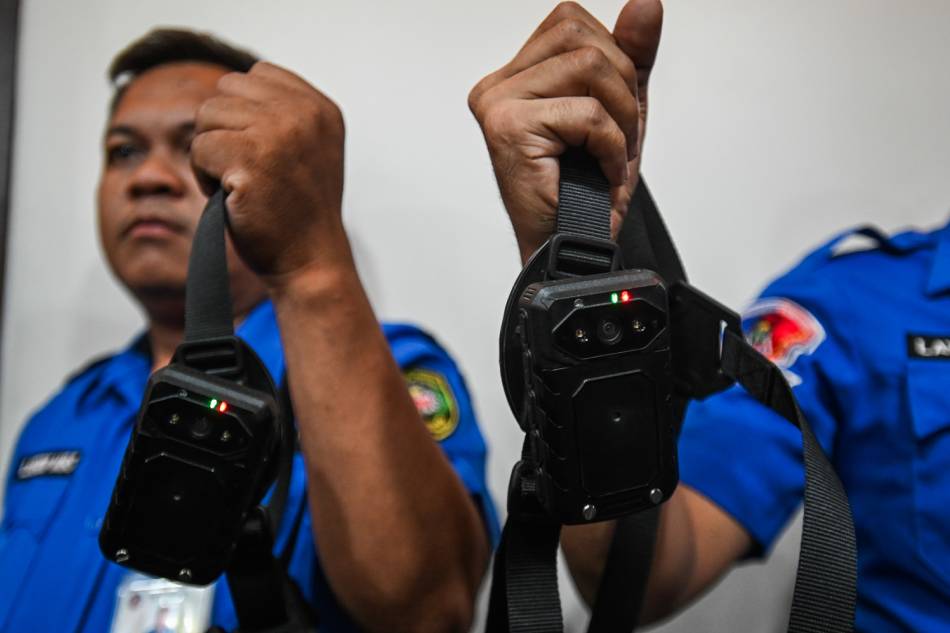MMDA bares draft rules on use of bodycams during traffic apprehensions | ABS-CBN
ADVERTISEMENT

Welcome, Kapamilya! We use cookies to improve your browsing experience. Continuing to use this site means you agree to our use of cookies. Tell me more!
MMDA bares draft rules on use of bodycams during traffic apprehensions
MMDA bares draft rules on use of bodycams during traffic apprehensions
Andrea Taguines,
ABS-CBN News
Published Jul 05, 2023 06:58 PM PHT
|
Updated Jul 05, 2023 07:37 PM PHT
MANILA -- The Metropolitan Manila Development Authority (MMDA) has set initial guidelines on the use of body-worn cameras when apprehending traffic violators.
MANILA -- The Metropolitan Manila Development Authority (MMDA) has set initial guidelines on the use of body-worn cameras when apprehending traffic violators.
Victor Trinidad, the Officer-in-Charge of MMDA’s Office of the Assistant General Manager for Planning, explained to stakeholders on Wednesday that the cameras would start recording as soon as the traffic enforcer arrives at his area of operation.
Victor Trinidad, the Officer-in-Charge of MMDA’s Office of the Assistant General Manager for Planning, explained to stakeholders on Wednesday that the cameras would start recording as soon as the traffic enforcer arrives at his area of operation.
MMDA chairman Don Artes also assured them that traffic enforcers will not have the ability to stop the camera from recording or to turn it off to prevent incidents of bribery and extortion.
MMDA chairman Don Artes also assured them that traffic enforcers will not have the ability to stop the camera from recording or to turn it off to prevent incidents of bribery and extortion.
He added that those who will try to tamper with the body camera will be sanctioned.
He added that those who will try to tamper with the body camera will be sanctioned.
ADVERTISEMENT
“Ang purpose po nito, unang-una, ay para maiwasan yung korapsyon, yung pangongotong. Pangalawa, proteksyon po ito sa mga nagmamaneho dahil kung sakaling sa palagay ng ating mga motorista na hindi tama yung pagkakahuli sa kanila, even yung manner ng pagkakahuli sa kanya ay pwede pong magamit na ebidensiya itong mga footages na ito para sa pagcontest sa paghuli sa kanila,” said Artes.
“Ang purpose po nito, unang-una, ay para maiwasan yung korapsyon, yung pangongotong. Pangalawa, proteksyon po ito sa mga nagmamaneho dahil kung sakaling sa palagay ng ating mga motorista na hindi tama yung pagkakahuli sa kanila, even yung manner ng pagkakahuli sa kanya ay pwede pong magamit na ebidensiya itong mga footages na ito para sa pagcontest sa paghuli sa kanila,” said Artes.
Traffic enforcers will also be required to make a full disclosure to motorists.
Traffic enforcers will also be required to make a full disclosure to motorists.
Trinidad said when flagging violators, enforcers must first identify themselves, state their location and the traffic violation they observed, and advise the motorist that their exchange is being recorded and monitored in the MMDA Command and Coordinating Center.
Trinidad said when flagging violators, enforcers must first identify themselves, state their location and the traffic violation they observed, and advise the motorist that their exchange is being recorded and monitored in the MMDA Command and Coordinating Center.
Transport groups welcomed the planned use of body cameras.
Transport groups welcomed the planned use of body cameras.
Jojo Martin of Pasang Masda said when the program is fully adapted, there may be no need for the No Contact Apprehension Policy anymore.
Jojo Martin of Pasang Masda said when the program is fully adapted, there may be no need for the No Contact Apprehension Policy anymore.
The MMDA has given all stakeholders a week to submit their comments and suggestions with regard to the guidelines.
The MMDA has given all stakeholders a week to submit their comments and suggestions with regard to the guidelines.
Artes said they aim to submit the final guidelines to the Metro Manila Council for its approval by September.
Artes said they aim to submit the final guidelines to the Metro Manila Council for its approval by September.
So far, the MMDA has procured 120 body-worn cameras. They plan to purchase more before proceeding with the implementation.
So far, the MMDA has procured 120 body-worn cameras. They plan to purchase more before proceeding with the implementation.
Artes said they have allotted P24 million for the project.
Artes said they have allotted P24 million for the project.
The body cameras have a battery life of eight hours which is equivalent to one shift of a traffic enforcer.
The body cameras have a battery life of eight hours which is equivalent to one shift of a traffic enforcer.
ADVERTISEMENT
ADVERTISEMENT



